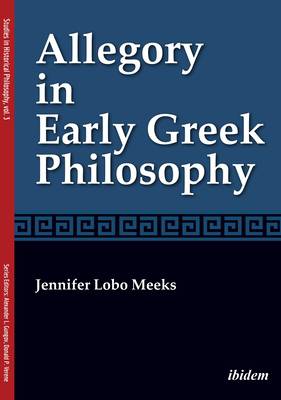
Door een staking bij bpost kan je online bestelling op dit moment iets langer onderweg zijn dan voorzien. Dringend iets nodig? Onze winkels ontvangen jou met open armen!
- Afhalen na 1 uur in een winkel met voorraad
- Gratis thuislevering in België vanaf € 30
- Ruim aanbod met 7 miljoen producten
Door een staking bij bpost kan je online bestelling op dit moment iets langer onderweg zijn dan voorzien. Dringend iets nodig? Onze winkels ontvangen jou met open armen!
- Afhalen na 1 uur in een winkel met voorraad
- Gratis thuislevering in België vanaf € 30
- Ruim aanbod met 7 miljoen producten
Zoeken
Omschrijving
Allegory in Early Greek Philosophy examines the role that allegory plays in Greek thought, particularly in the transition from the mythic tradition of the archaic poets to the philosophical traditions of the Presocratics and Plato. It explores how a mode of speech that "says one thing, but means another" is integral to philosophy, which otherwise seeks to achieve clarity and precision in its discourse. By providing the early Greek thinkers with a way of defending and appropriating the poetic wisdom of their predecessors, allegory enables philosophy to locate and recover its own origins in the mythic tradition. Allegory allows philosophy simultaneously to move beyond mythos and express the whole in terms of logos, a rational account in which reality is represented in a more abstract and universal way than myth allows.
Specificaties
Betrokkenen
- Auteur(s):
- Uitgeverij:
Inhoud
- Aantal bladzijden:
- 150
- Taal:
- Engels
- Reeks:
Eigenschappen
- Productcode (EAN):
- 9783838214252
- Verschijningsdatum:
- 20/10/2020
- Uitvoering:
- Paperback
- Formaat:
- Trade paperback (VS)
- Afmetingen:
- 145 mm x 206 mm
- Gewicht:
- 158 g

Alleen bij Standaard Boekhandel
+ 52 punten op je klantenkaart van Standaard Boekhandel
Beoordelingen
We publiceren alleen reviews die voldoen aan de voorwaarden voor reviews. Bekijk onze voorwaarden voor reviews.











